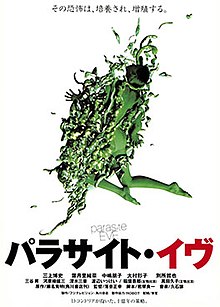| Parasite Eve | |
|---|---|
 Theatrical release poster | |
| Directed by | Masayuki Ochiai |
| Written by | Ryoichi Kimizuka[1] |
| Based on | Parasite Eve by Hideaki Sena |
| Produced by |
|
| Starring |
|
| Cinematography | Kozo Shibasaki |
| Edited by | Yoshifumi Fukuzawa[2] |
| Music by | Joe Hisaishi[3] |
Production companies | |
| Distributed by | Toho |
Release date |
|
Running time | 120 minutes[3] |
| Country | Japan |
| Language | Japanese |
| Budget | ¥550 million |
| Box office | ¥490 million |
Parasite Eve (Japanese: パラサイト・イヴ, Hepburn: Parasaito Ivu) is a 1997 Japanese science fiction film that was directed by Masayuki Ochiai and is based on the 1995 novel Parasite Eve by Hideaki Sena. Kiyomi (Riona Hazuki), the wife of Toshiaki Nagashima (Hiroshi Mikami), is left brain dead after a traffic accident on the day of their first wedding anniversary. Nagashima attempts to make Kiyomi live again by making a deal with a doctor who wants to harvest Kiyomi's kidneys for transplanting into a young girl in the same hospital. Nagashima agrees on the condition that he can have his wife's liver. While Nagashima experiments with the organ, the doctor finds one night the samples have emerged as a gelatinous form in the form of Toshiaki's dead wife and reveal themselves as an organization of sentient mitochondria that are bent on making a new species that will wipe out humanity.
In 1997, Kadokawa Shoten decided to use the film production side of its business to develop a film version of Parasite Eve, making it its first film in three years. The film was co-produced by Kadokawa and Fuji TV's Motion Picture Division. Ochiai made his debut as a feature film director, having worked in Japanese television on horror series such as Night Head. Parasite Eve was filmed in eight weeks with a budget of ¥550 million. Ochiai was not entirely pleased with the result of the film, feeling he was pressured to push the love story element of the story, later saying there were "so many compromises I had to make that it couldn't be a true horror movie".[4] The film was released in Japan on February 1, 1997, with limited release outside the country. It received mixed reviews; The Daily Yomiuri found the film "mildly enjoyable at times"[5] and Fangoria called it "flawed but fascinating".[6]
- ^ a b Galbraith IV 2008, p. 398.
- ^ Balmain 2012, p. 209.
- ^ a b Kalat 2007, p. 274.
- ^ Kalat 2007, p. 169.
- ^ Gerow 1997, p. 8.
- ^ Cite error: The named reference
cycwas invoked but never defined (see the help page).